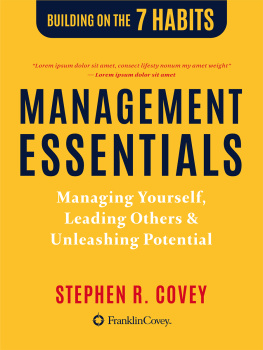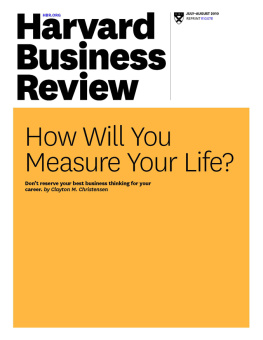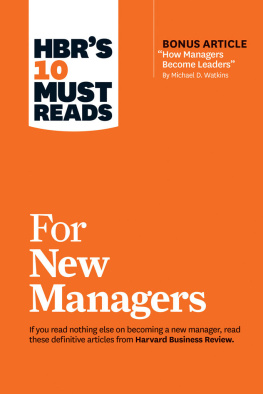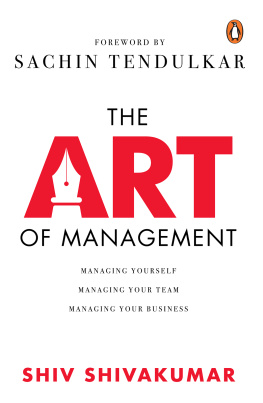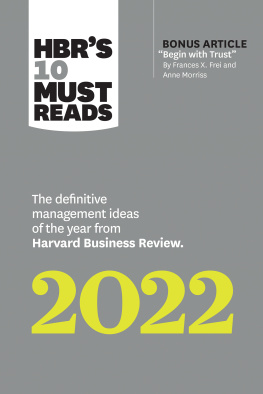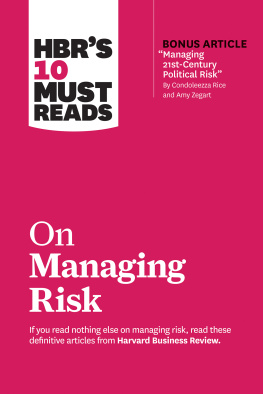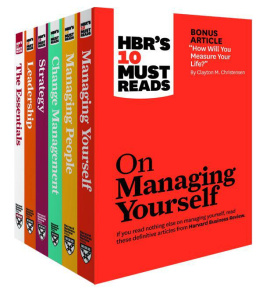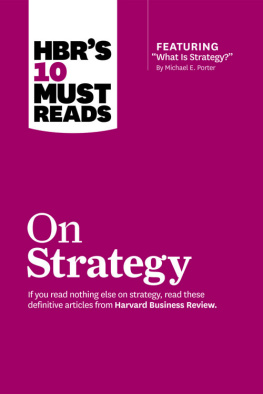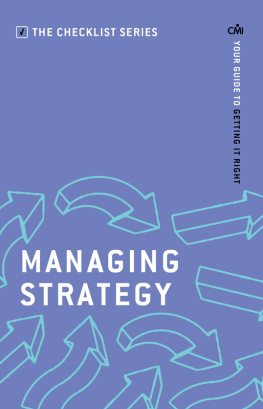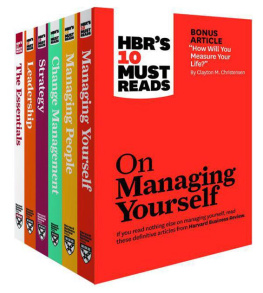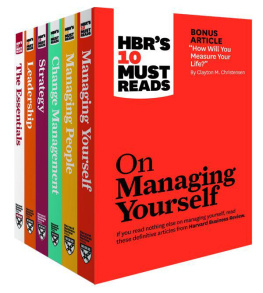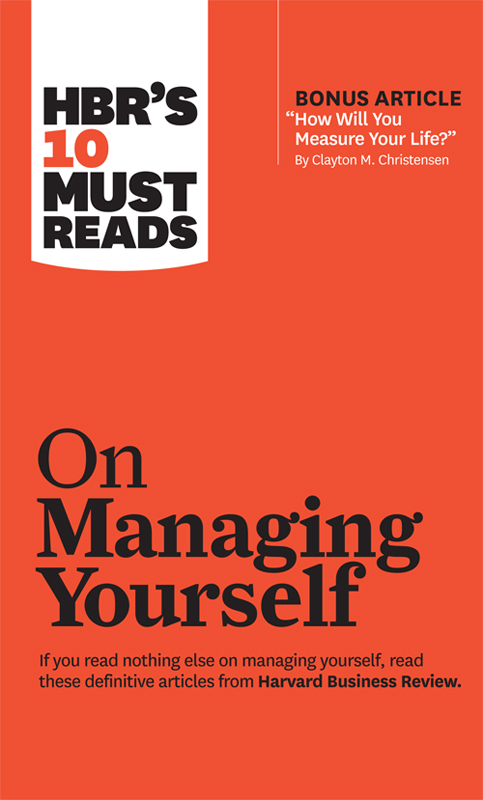Copyright 2010 Harvard Business School Publishing Corporation
All rights reserved
No part of this publication may be reproduced, stored in or introduced into a retrieval system, or transmitted, in any form, or by any means (electronic, mechanical, photocopying, recording, or otherwise), without the prior permission of the publisher. Requests for permission should be directed to , or mailed to Permissions, Harvard Business School Publishing, 60 Harvard Way, Boston, Massachusetts 02163.
First eBook Edition: January 2011
ISBN: 978-1-4221-5799-2
by Clayton M. Christensen
BEFORE I PUBLISHED The Innovators Dilemma, I got a call from Andrew Grove, then the chairman of Intel. He had read one of my early papers about disruptive technology, and he asked if I could talk to his direct reports and explain my research and what it implied for Intel. Excited, I flew to Silicon Valley and showed up at the appointed time, only to have Grove say, Look, stuff has happened. We have only 10 minutes for you. Tell us what your model of disruption means for Intel. I said that I couldntthat I needed a full 30 minutes to explain the model, because only with it as context would any comments about Intel make sense. Ten minutes into my explanation, Grove interrupted: Look, Ive got your model. Just tell us what it means for Intel.
I insisted that I needed 10 more minutes to describe how the process of disruption had worked its way through a very different industry, steel, so that he and his team could understand how disruption worked. I told the story of how Nucor and other steel minimills had begun by attacking the lowest end of the marketsteel reinforcing bars, or rebarand later moved up toward the high end, undercutting the traditional steel mills.
When I finished the minimill story, Grove said, OK, I get it. What it means for Intel is ..., and then went on to articulate what would become the companys strategy for going to the bottom of the market to launch the Celeron processor.
Ive thought about that a million times since. If I had been suckered into telling Andy Grove what he should think about the microprocessor business, Id have been killed. But instead of telling him what to think, I taught him how to thinkand then he reached what I felt was the correct decision on his own.
That experience had a profound influence on me. When people ask what I think they should do, I rarely answer their question directly. Instead, I run the question aloud through one of my models. Ill describe how the process in the model worked its way through an industry quite different from their own. And then, more often than not, theyll say, OK, I get it. And theyll answer their own question more insightfully than I could have.
My class at HBS is structured to help my students understand what good management theory is and how it is built. To that backbone I attach different models or theories that help students think about the various dimensions of a general managers job in stimulating innovation and growth. In each session we look at one company through the lenses of those theoriesusing them to explain how the company got into its situation and to examine what managerial actions will yield the needed results.
Idea in Brief
Harvard Business Schools Christensen teaches aspiring MBAs how to apply management and innovation theories to build stronger companies. But he also believes that these models can help people lead better lives. In this article, he explains how, exploring questions everyone needs to ask. How can I be happy in my career? How can I be sure that my relationship with my family is an enduring source of happiness? And how can I live my life with integrity? The answer to the first question comes from Frederick Herzbergs assertion that the most powerful motivator isnt money; its the opportunity to learn, grow in responsibilities, contribute, and be recognized. Thats why management, if practiced well, can be the noblest of occupations; no others offer as many ways to help people find those opportunities. It isnt about buying, selling, and investing in companies, as many think. The principles of resource allocation can help people attain happiness at home. If not managed masterfully, what emerges from a firms resource allocation process can be very different from the strategy management intended to follow. Thats true in life too: If youre not guided by a clear sense of purpose, youre likely to fritter away your time and energy on obtaining the most tangible, short-term signs of achievement, not whats really important to you. And just as a focus on marginal costs can cause bad corporate decisions, it can lead people astray. The marginal cost of doing something wrong just this once always seems alluringly low. You dont see the end result to which that path leads. The key is to define what you stand for and draw the line in a safe place.
On the last day of class, I ask my students to turn those theoretical lenses on themselves, to find cogent answers to three questions: First, how can I be sure that Ill be happy in my career? Second, how can I be sure that my relationships with my spouse and my family become an enduring source of happiness? Third, how can I be sure Ill stay out of jail? Though the last question sounds lighthearted, its not. Two of the 32 people in my Rhodes scholar class spent time in jail. Jeff Skilling of Enron fame was a classmate of mine at HBS. These were good guysbut something in their lives sent them off in the wrong direction.
As the students discuss the answers to these questions, I open my own life to them as a case study of sorts, to illustrate how they can use the theories from our course to guide their life decisions.
One of the theories that gives great insight on the first questionhow to be sure we find happiness in our careersis from Frederick Herzberg, who asserts that the powerful motivator in our lives isnt money; its the opportunity to learn, grow in responsibilities, contribute to others, and be recognized for achievements. I tell the students about a vision of sorts I had while I was running the company I founded before becoming an academic. In my minds eye I saw one of my managers leave for work one morning with a relatively strong level of self-esteem. Then I pictured her driving home to her family 10 hours later, feeling unappreciated, frustrated, underutilized, and demeaned. I imagined how profoundly her lowered self-esteem affected the way she interacted with her children. The vision in my mind then fast-forwarded to another day, when she drove home with greater self-esteemfeeling that she had learned a lot, been recognized for achieving valuable things, and played a significant role in the success of some important initiatives. I then imagined how positively that affected her as a spouse and a parent. My conclusion: Management is the most noble of professions if its practiced well. No other occupation offers as many ways to help others learn and grow, take responsibility and be recognized for achievement, and contribute to the success of a team. More and more MBA students come to school thinking that a career in business means buying, selling, and investing in companies. Thats unfortunate. Doing deals doesnt yield the deep rewards that come from building up people.
I want students to leave my classroom knowing that.
Create a Strategy for Your Life
A theory that is helpful in answering the second questionHow can I ensure that my relationship with my family proves to be an enduring source of happiness?concerns how strategy is defined and implemented. Its primary insight is that a companys strategy is determined by the types of initiatives that management invests in. If a companys resource allocation process is not managed masterfully, what emerges from it can be very different from what management intended. Because companies decision-making systems are designed to steer investments to initiatives that offer the most tangible and immediate returns, companies shortchange investments in initiatives that are crucial to their long-term strategies.


